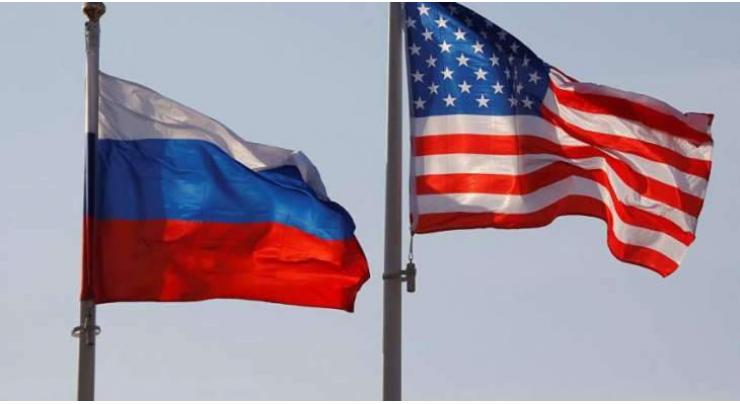
New US-Russia Arms Deal May Take Years To Negotiate - Ex-US Diplomat
Sumaira FH Published July 18, 2019 | 09:12 PM

US-Russia talks on a new arms control deal to replace the collapsed Intermediate-Range Nuclear (INF) Forces will take years, but hopefully the two sides will manage to set in motion a new negotiating process in Geneva, Howard Stoffer, a former US State Department senior foreign service officer and the former UN director of counterterrorism, told Sputnik
On Wednesday, Russia and US top officials met in Geneva for strategic dialogue talks. According to Russian Deputy Foreign Minister Sergey Ryabkov, who led the Russian delegation, the two sides thoroughly discussed the extension of the Strategic Arms Reduction Treaty (START), but made no progress on the collapsing Intermediate-Range Nuclear Forces Treaty (INF).
The former US diplomat, who served as adviser to the US-Soviet negotiations on the INF and START treaties, noted that both landmark arms control deals whose future is now ambiguous took years to negotiate.
"Because these are the most important strategic military capabilities that each side has, so each side wants to be absolutely certain that the treaties that are concluded are ironclad, and that they include a proper ability to monitor or inspect any of its provisions ... So these new talks, I think, will take years," Stoffer said.
He noted, however, that the problem was that both countries did not have years as the New START treaty was expiring soon, but expressed hope that both sides would agree to negotiate "in good faith" and continue to fulfill their obligations under the New START treaty until a new deal is concluded.
"Hopefully, they will reach some kind of an agreement. Obviously, not now, but they will set in motion a process in Geneva that will go on for month and eventually reach an agreement that would be acceptable not only to two sides, but the rest of the world will be shown that the large arsenals of Russia and the Unites States can be reduced and that other countries should not acquire nuclear weapons under the Non-Proliferation Treaty," Stoffer, who is now an associate professor at the University of New Haven, said.
He stressed that Russia and the United States do not need to have 6,000 nuclear weapons each as this is more than enough to destroy the planet completely.
"We have to make the world safer, and to make the world safer we have to find a way to reduce the slice of these strategic missiles and shorter-range missiles ... In today's world, you don't need 6,000 weapons on each side. That would completely destroy the whole planet anyway ... The interesting thing is that the SALT [Strategic Arms Limitation Talks] and the START treaties were negotiated during times of much higher tensions between our two countries than before. In a way, this kind of agreements were confidence-building mechanism," Stoffer said.
Both Moscow and Washington have repeatedly accused each other of INF Treaty violations. The United States has been claiming that Russia allegedly tested and deployed the 9M729 ground-launched cruise missile, arguing it has a range of more than 500 kilometers, which contradicts the treaty. Russia has denied the allegations and said the US Aegis Ashore MK-41 defense system can be used to launch cruise missiles at prohibited ranges.
In February, the United States formally suspended its INF obligations, triggering a six-month withdrawal process. Earlier in July, Russian President Vladimir Putin signed a decree suspending Moscow's participation in the accord.
The other accord in question, the New START, went into force in 2011 and covers a ten-year period with the possibility of a five-year extension. The agreement limits the number of deployed intercontinental ballistic missiles, submarine-launched ballistic missiles, nuclear armed bombers and nuclear warheads.
Related Topics
Recent Stories

Tennis: ATP Barcelona Open results - 1st update

Swiatek's perfect 10 in Stuttgart as Vondrousova stuns Sabalenka

Arandu's roads closed due to flooding

Oil tanker catches fire in Islamabad’s Blue Area

Pakistan committed to ensure safety of foreign nationals: FO

Tennis: WTA Stuttgart results - 1st update

Four passengers injured as train hit an empty vehicle

Over- speeding bus crushed to death two bike riders

Turkey's Freedom Flotilla ready to set sail for Gaza

French teen dies from heart failure after knife attack near school

Iranians appear unfazed by Isfahan blasts

UAF celebrates Int'l Chinese Language Day
More Stories From World
-
Togo lawmakers approve contested political reform
2 hours ago -
NATO must choose 'whether we indeed are allies': Zelensky
2 hours ago -
US House to vote on Ukraine, Israel, Taiwan aid package
2 hours ago -
Calls for calm after reported Israeli strike on Iran
3 hours ago -
IMF calls on EU to deepen single market integration to boost growth
3 hours ago -
Second Ecuadoran mayor killed ahead of anti-crime referendum: police
3 hours ago
-
Oil, gas drilling blocked in Alaska wilds as Biden seeks green cred
3 hours ago -
Man sets self on fire outside Trump trial
3 hours ago -

Turkey's Freedom Flotilla ready to set sail for Gaza
5 hours ago -

French teen dies from heart failure after knife attack near school
5 hours ago -

Iranians appear unfazed by Isfahan blasts
5 hours ago -

Ecuador mayor killed ahead of anti-crime referendum: police
5 hours ago



